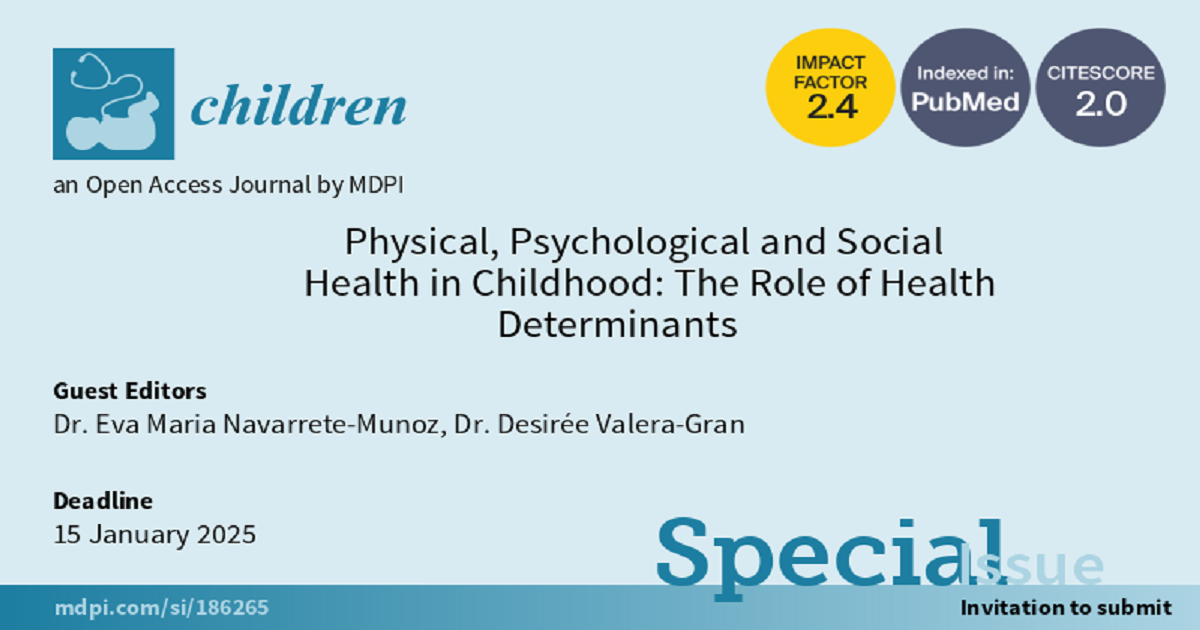- 2.1Impact Factor
- 3.8CiteScore
- 16 daysTime to First Decision
Physical, Psychological and Social Health in Childhood: The Role of Health Determinants
This special issue belongs to the section “Global Pediatric Health“.
Special Issue Information
Dear Colleagues,
A comprehensive understanding of the determinants affecting the physical, psychological, and social dimensions of childhood is imperative for the promotion of lifelong well-being and optimal health outcomes. By conducting an accurate assessment of these factors, we can augment our insights, providing a more robust foundation for the development of evidence-based strategies and policies aimed at fostering the holistic health of children.
The forthcoming Special Issue is dedicated to describing the magnitude of changes in children's health, encompassing obesity, adiposity, cardiometabolic risk, sensory reactivity, coordination disorders, emotional and behavioral problems, mental and psychomotor problems, and other factors that affect their well-being. Additionally, we seek to compile papers that examine the influence of environmental factors on physical, mental, or social health outcomes. We extend our invitation to the submission of diverse types of manuscripts, such as original research articles and reviews (scoping reviews, systematic reviews, and/or meta-analyses). Furthermore, diverse methodological and theoretical approaches are also welcome to be submitted.
Dr. Eva Maria Navarrete-Munoz
Dr. Desirée Valera-Gran
Guest Editors
Manuscript Submission Information
Manuscripts should be submitted online at www.mdpi.com by registering and logging in to this website. Once you are registered, click here to go to the submission form. Manuscripts can be submitted until the deadline. All submissions that pass pre-check are peer-reviewed. Accepted papers will be published continuously in the journal (as soon as accepted) and will be listed together on the special issue website. Research articles, review articles as well as short communications are invited. For planned papers, a title and short abstract (about 250 words) can be sent to the Editorial Office for assessment.
Submitted manuscripts should not have been published previously, nor be under consideration for publication elsewhere (except conference proceedings papers). All manuscripts are thoroughly refereed through a single-blind peer-review process. A guide for authors and other relevant information for submission of manuscripts is available on the Instructions for Authors page. Children is an international peer-reviewed open access monthly journal published by MDPI.
Please visit the Instructions for Authors page before submitting a manuscript. The Article Processing Charge (APC) for publication in this open access journal is 2400 CHF (Swiss Francs). Submitted papers should be well formatted and use good English. Authors may use MDPI's English editing service prior to publication or during author revisions.
Keywords
- sensory reactivity
- cardiometabolic factors
- neuropsychological development
- neurodevelopmental disorders
- mental health
- well-being
- emotional and behavioral problems
- nutritional factors
- contextual factors
- physical activity
- parental determinants
- social problems and factors

Benefits of Publishing in a Special Issue
- Ease of navigation: Grouping papers by topic helps scholars navigate broad scope journals more efficiently.
- Greater discoverability: Special Issues support the reach and impact of scientific research. Articles in Special Issues are more discoverable and cited more frequently.
- Expansion of research network: Special Issues facilitate connections among authors, fostering scientific collaborations.
- External promotion: Articles in Special Issues are often promoted through the journal's social media, increasing their visibility.
- e-Book format: Special Issues with more than 10 articles can be published as dedicated e-books, ensuring wide and rapid dissemination.

